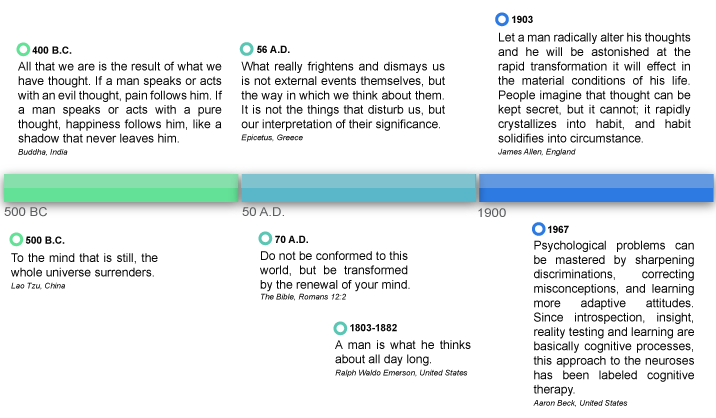Cognitive Behavioral Therapy (CBT)
The core idea underlying CBT (Cognitive Behavioral Therapy) and other related therapies is that by better understanding and influencing our own personal thought patterns, we can better understand and influence our moods and emotional patterns, thus enabling us to make smarter choices in our attempts to master the challenges of life. This idea actually has been circulating for thousands of years in all parts of the world, as depicted on the timeline below.

As the above collection of quotes reveals, at the intersection of many schools of thought and many years of existence lies this fundamental idea: Learning to shape and influence our own thinking is a core aspect of feeling good and living well.
a history of CBT
Aaron Beck (founder of Cognitive Therapy) and Albert Ellis (founder of Rational Emotive Behavior Therapy) are widely considered the first psychotherapeutic theorists to systematize and fully articulate the premise that modes of thinking have an enormous effect on emotions and behavior. This was in the 1950s and 1960s and has expanded ever since.
More importantly, both Beck and Ellis found, in clinical settings, that helping people to influence their own thinking was highly possible and enormously beneficial. This was a radical departure from Freud’s psychoanalysis, something each of them had been trained in. Since then, many therapies have come into existence by building off of and expanding on the core ideas first established in CBT. For further reading, see Marsha Linehan’s DBT (Dialectical Behavior Therapy), Steven Hayes’ ACT (Acceptance and Commitment Therapy) and Jeffrey Young’s Schema Therapy.
facing and replacing self-defeating thinking
Our minds can take us to some pretty dark places. It is quite common for our own personal thought patterns to play a major role in us feeling down, insecure, depressed, anxious, scattered, or fearful. Of course, biological factors and life circumstances play important parts in our emotional lives, but it is the habitual activity of our own minds that has the greatest influence in determining the quality of our daily experience.
In an ideal world, learning to recognize and understand the dynamics and consequences of our own thought patterns would be an integral part of elementary school curriculum and beyond. Instead, this fundamental aspect of our lives, more often than not, remains a mystery to us. Worse yet, far too many of us learn early on that when we find ourselves in the midst of psychological suffering and emotional pain, the solution lies in finding the quickest escape route. Many of us go through life never having learned how to effectively deal with and process psychological suffering and emotional pain in healthy ways—in ways that actually advance our development. In the absence of this learning, we are more likely in adulthood to suffer from chronic depression and anxiety, repeated interpersonal conflicts, career stagnation, excessive loneliness, addiction, deficits in relational skills, financial deprivation, repeated self-sabotage and more. This is where CBT and related therapies come in—they are robust tools by which effective therapists can help people to be more creative, strategic and wise about their own habits of the mind and, by extension, their own habits of living.